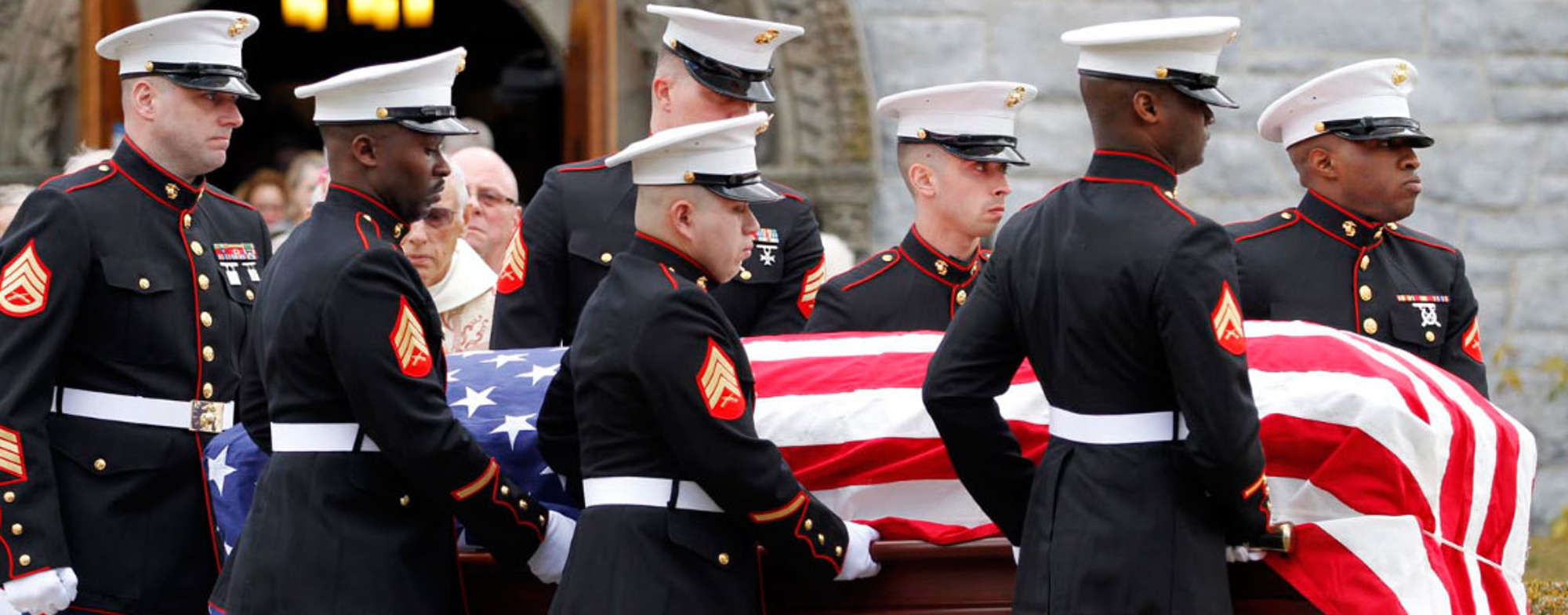Honor Your Brother's Memory By NOT Building Your Brand On His Sacrifice
Soldiers often joke about the process of filling out a “death packet.” Doing so eases the tensions of pre-deployment anxiety. Before a trip to Iraq, one of my friends told everyone that he requested that his remains be cremated and dumped in a chalk station at the company gym. This way not even death would stop his “gainz.” He, of course, actually requested a hometown burial and left a letter to be delivered to his mother.
Attempting humor, I asked a Hispanic friend whether his family would immortalize his KIA with a sticker on the rear of their vehicles that depicted the Virgin Mary and the years of his birth and death. My friend sighed and laughed at the same time, indicating he’d actually had such a conversation with his family.
In a relaxed manner he said, “You know, if it helps them grieve, what do I care? Besides, I’ll be too dead to be embarrassed.”
We all mourn in different ways. As a senior in high school I was a voyeur to the invasion of Iraq. I read every article and watched every news segment about the war. I wore yellow ribbons on my clothes to school and developed political opinions that exceeded my actual life experience and understanding of combat.
Then, the first scores of Americans started coming home in body bags. At eighteen I had not experienced death. Much less wartime death. I also didn’t know any of the soldiers that were killed in action. Regardless, I wanted to show my support and decided to buy and wear a POW/MIA shirt as often as was socially acceptable.
Later, I expanded my mourners wardrobe to a black shirt with silver jump wings. I wore the shirt in solidarity with the soldiers that were being killed in Iraq, or at least that’s what I told myself. In reality, both shirts were props that I could use in conversation to let others know that I was going to enlist after high school. This allowed me to extract praise by trafficking in the actual sacrifice of the soldiers fighting in Iraq and Afghanistan.
I don’t reflect on my premature private first class behavior with disdain. I acknowledge that I was naive and unaware that my mourning was really just a mechanism for seeking attention.
Later in the Army, after my first friend was killed in action, I wanted to shout his name to the world. I wanted every one to know about him and the amazing person he was. Back then social media was still in its infancy, and the crude platforms didn’t facilitate the posting of dead soldiers the way Instagram or Facebook do today.
In a conversation with my parents, I let them know that one of my friends had been killed. They received the information and didn’t exactly know what to do with its weight. My dad expressed condolences, but then felt he needed to say more. He didn’t need to. Instead of adding definition to my mourning, he rambled and verbally ran in place. I felt that I was emotionally holding my parents hostage and changed the subject.
More than a decade later and in my thirties, I look back at that moment and realize that I was reenacting a similar type of misplaced grieving from my teenage years. Mentioning that my friend was killed allowed me to passively collect attention through his sacrifice. This was not intentional or malicious. I simply was not equipped with the emotional tools to deal with the situation. Yet, by awkwardly forcing the news on other people, I became aware of the odd entitlement a man inherits by announcing that a friend was killed in war.
Acknowledging your pain, but not necessarily knowing how to react, other people will give you unbiased and nonjudgmental sympathy. And therein lay the reason as to why so many veterans are tempted into misusing narratives of memorial and suicide. Because it forces other people to deliver one of life’s most difficult social demands: judgement free attention.

We shouldn’t criticize a person in mourning because everyone grieves in different ways and with varying levels of maturity. However, memorials should always place attention on the grieved, not the griever.
Several years and funerals later, I was at the celebration of life for my most recent friend killed in action. His was a true Irish wake that overflowed with song, laughter, and drink. Still, not everyone was there to celebrate his life. Loitering between different groups, a woman was leveraging the awkward entitlement that comes with announcing your friend, or in this case, lover was killed in action. But this woman wasn’t our friend’s lover. Much less had she ever been on a real date with him.
She was a brief fling that left his life almost as quickly as she entered it. But that night, they might as well have been married for 20 years. The would be widow forced uncomfortable sympathy from others, and rarely if at all talked about the positive impact our friend made in her life. Instead, the wake was her way to accumulate judgement free attention that she didn’t know how to otherwise acquire in life.
Perhaps the unending hangover of a 20-year war has desensitized our social tools for grieving. Or maybe some veterans leverage the death of soldiers because it allows them to find relevance in a civilian world they’ve not yet transitioned into. Again, we shouldn’t rush to pass judgment because everyone mourns in different ways and with different levels of maturity. But the one thing I will say with certainty is that altruism in the commercial sector is incredibly rare.
Earlier this month a Special Operations soldier was killed in Somalia. Upon seeing the headline I felt myself wince. First at the reality that an American had made the ultimate sacrifice in service to his country. And second because I suspected that the commercial military industry was already attempting to profit from his death.
What would have been in poor taste in 2003 has become commonplace today. As soon as a soldier is killed, within 24-hours there are already widgets or t-shirts being sold on his behalf for “charity.”
I don’t buy into this at all.
If a company wants to donate to charity, it simply donates or holds a fundraiser in which it contributes all of the proceeds. It should not need to force unwanted products or overstocked inventory on us so that it can turn a sale, collect emails, and re-target us for future marketing campaigns.
When I first started my company, I sold a print of vintage style t-shirts and stated that I would donate a portion of the profits to charity. At the time, my business was a side hustle while I finished college. And being freshly separated from the military, I truly wanted to give back to a community that I was no longer a part of. In that way, selling the shirts was a way for me to maintain a connection to an identity that had long since slipped from my grasp.
Immediately, the shirts sold out. Not because they were of notable design, but because of the linkage I’d made to charity. This was my first, albeit unintended, introduction to commercialized altruism. It felt uncomfortable, and I decided to never again associate sales with charity. I donated all of the profits and decided that if in the future I wanted to donate, I would just donate.
Charity sales tactics can also be used to compensate for the absence of brand credibility. I see this with smaller less structured veteran companies that haven’t yet figured out how to reach an audience or determined whether they should be in business. Similar to telling someone your friend was killed in action, a company can traffic in the death of soldiers to boost their credibility. But when performed this way, it isn’t honoring the dead, it’s simply a black hat method for esteeming a mediocre brand.
After learning about the death of SSG Alexander Conrad in Somalia I checked my social feeds. As expected, companies and most individuals posted various forms of condolences and “RIP.” Some felt genuine, but most appeared robotic. What was the difference? Effort.
I find it hard to believe that an individual is mourning the death of a soldier—that he didn’t know or even serve in the same unit as—when his memorial post has less curation put into it than a Sunday brunch post from the previous weekend. I find it hard to believe companies are truly grieving when they robotically repost the American flag, unit insignia or cardboard slogan. Cookie cutter grief that incurs a zero empathy transactional cost, and are often reposts from other companies.
We must acknowledge the collective impact of how our society decides to mourn. Celebrating a soldier’s life and sharing the burden of grief with his family might become familiar acts during war, but we must never normalize the behavior. It is through routine that all conduct loses significance, and can be the difference between celebrating a friend’s life, versus stumbling around a bar sloppily seeking attention.
Aaron Barruga is the founder at Guerrilla Approach, where he teaches tactical marksmanship and vehicle tactics. He’s a part of the GWOT generation of SOF instructors that are modernizing training methodology, challenging stale doctrine, and shaming range theatrics.





